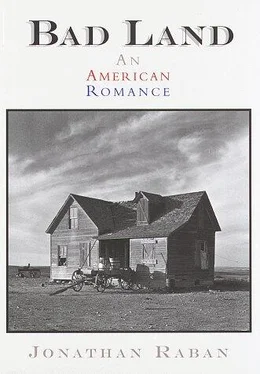If you go farther north from Mackinac, you hit the Canadian border in less than fifty miles. To find a classic American environment for his children to learn the Emersonian virtues, Freckles was going to have to become an immigrant and head off through Ontario in the direction of Hudson Bay. The United States, which had seemed inexhaustible only a generation ago, had run out of space.
The prospect of a homestead in Montana must have struck the readers of all these books as a miraculous conjunction between the real world and the world of private daydreams. I imagine a family — husband, wife, daughter, son — each lost in an age- and gender-appropriate bestseller. It’s hard to see the reader of Rebecca of Sunnybrook Farm swapping it for The Call of the Wild , but, however dissimilar their books, the family members would each find something of their separate fantasies reflected in that other book, published by the Milwaukee Road railroad. The extraordinarily fertile benchlands around Ismay and Mildred promised adventure, space, nature, escape at the same time as they offered the comforts of village life with its intimate gossip and its twin guardians of church and school. To have a home with no landlord, no rent, no mortgage … To be the lone plowman of one’s own acres … A homestead would combine the call of the wild with the warmth and security of Sunnybrook Farm.
The day before yesterday I was lunching with a friend who is the grandson of homesteaders. I recited the titles of the books I had been reading lately, dredged up from the basement of the Seattle public library. I thought them quaint oddities, but my friend claimed that he had read them all.
“ The Simple Life? A Girl of the Limberlost ?”
“Sure. Limberlost was a family word. When one of my sisters went all moony, we’d say she was away in the limberlost.”
“ The Trail of the Lonesome Pine? ”
“Wasn’t that written by a guy named Fox?”
“Where did you run across these books?”
They were all in his grandmother’s house, in Ismay.
In 1909 the roadbed was still soft, and when the emigrant train pulled out of Marmarth, North Dakota, its speed didn’t rise above that of a reasonably agile man on foot. As usual, it was already running more than five hours late; the published timetable was another railroad fiction. With the sun sinking fast toward the horizon, the train crept through a sudden irruption of badlands terrain, past mushrooms of sandstone on stalks of pale gray clay.
At the back of the train were the emigrant cars, each with a family, its livestock, furniture and farm implements snugly boxed in a single wagon. Whenever the train stopped at a station, these families could be seen living the life of Reilly: they slept on brassbound feather beds, tipped luxuriously back in rockers, played cards around their dining tables, while their cattle grieved and snorted at the bars of their compartments. To rent an emigrant car was relatively expensive. From Chicago to Miles City it cost 49¢ per hundred pounds of movables, with a minimum charge of $98 a car. The people aboard were nearly all farmers from the Midwest and as the land inched past they watched it closely, furtively, pretending to be engrossed by their newspapers or their hands of cards.
The polyglot crowd in the coaches that made up the forward end of the train had to stow their belongings as best they could. Their stuff, parceled in blankets, cardboard boxes, old flour sacks and flimsy suitcases lashed shut with rope, spilled out into the gangways of the carriages, where it served as seating for children and beds for household cats. The toilets (one at each end of every coach), the poorly trimmed oil lamps, the improvised cooking arrangements and the scanty opportunities on the trip for washing, gave the coaches a powerful and complicated smell that many of the settlers’ children would be able to recall in their nonage.
The journey had to be survived on a bare wood-slatted seat. With the temperature outside close to 90° and the train barely moving, the oppressive breadth of America was brought painfully home to every passenger. The stations — Selby … McLaughlin … Haynes … Reeder … Bowman … Rhame — slowly came and slowly went, their names empty of any meaningful association. At close to noon, the Missouri River had been crossed at Mobridge, South Dakota; since then there had been nothing in the geography to engage the eye. The badlands formations arrived as a welcome break; they gave one something to look at, provided a talking point in their queer resemblance to animals, human faces, architecture.
A number of the home seekers were old hands at long journeys. Aboard the train were ex-soldiers from the armies of Europe. In one coach a gentle and self-possessed German played tunes on a clarinet to an audience of children. He had served as a bandsman in the Russian army of Tsar Nicholas II and had played his clarinet during the Russian retreat from the Yalu River on the Korean — Chinese border in the recent Russo-Japanese war. There were other veterans of that war from Moldavia, Bessarabia, Romania, the Ukraine, along with Prussians from the army of Kaiser Bill and men from half a dozen languages and countries who had lately been patrolling the trouble-ridden borders of the Austria — Hungary empire. There were separate knots of Swedish, Norwegian and Irish people, all of whom had escaped to America from blighted rural economies back home.
Few of these Europeans were fresh off the boat. Most had spent several months, and some had spent years, working in the United States and saving enough from their wages to set up a homestead and keep it going through the first Montana winter. They’d taken jobs on construction sites; in railway gangs and logging camps; in garment factories. Their English tended to be still broken, but getting faster and more idiomatic. They were dressed in the American uniform of smart off-the-peg department-store clothes. Had it not been for their littered baggage, the women in shirtwaists and the men in snappy summer suits might have been taken for tourists on a sightseeing excursion.
The best accommodation in the coaches was the curtained overhead sleeping berths, where, for a premium, one might sprawl and read in tolerable privacy. On one of these bunks lay Elam McDowell, a newspaper reporter from Minneapolis, who had given up his job at the Minneapolis Tribune in order to stake out a homestead and edit the Terry Tribune , whose owner, Alfred Wright, had written to the Minneapolis paper to inquire if they could recommend a suitable journalist for the Terry job. McDowell had left his wife, Irene, and their three daughters back in the city. They’d join him later in the year when the homestead was under the plow and the house built.
In another sleeping berth, Ralph Norris, six feet four, was cramped for space. Norris, a graduate of the University of Illinois at Chicago, had been a famous college athlete. He had broken the world record for the pole vault, though his record was disappointingly short-lived; it was broken again exactly eight minutes after being set. Norris’s fiancée, Virginia Wilson, had just been diagnosed as having tuberculosis. Her doctor believed that a change of air might bring about a cure, and the high, dry climate of the Plains was thought to be as good for the disease, if not better, as that of Switzerland. Norris, who had made a careful study of the pamphlets and could practically recite Campbell’s book by heart, had nailed Mildred as the place to make a fortune and restore Virginia’s health. As soon as the house was up, they’d marry — and Ralph Norris spent much of his time constructing in his head an airy yet snug sanatorium where his bride, liberated from the miasma of the city, would at last shake off her illness for good.
Читать дальше












